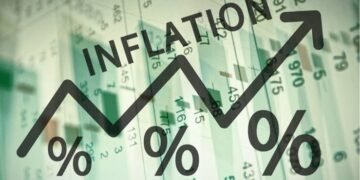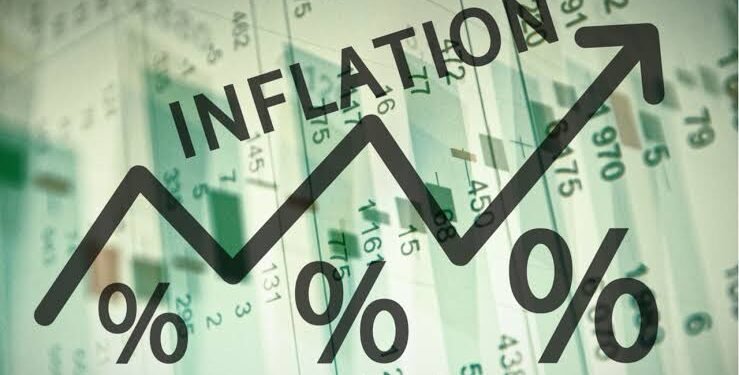On Monday, a new statistics revealed that of the N4.26 trillion in total income that was available to finance the 2022 budget in the first three quarters of last year, a staggering N4.23 trillion went into debt financing, highlighting Nigeria’s dire fiscal condition for the next fiscal year.
The figure, which can be found in the budget performance report created by the Budget Office and the Office of the Accountant General of the Federation (OAGF), effectively increased the nation’s debt service to revenue ratio to 99.2%, the highest the nation would ever record for a comparable time horizon.
The forecast, which covers the period from January to November and is included in the 2023 budget draft, is close to 10 percentage points lower than the actual number. According to the paper, the Federal Government has spent N5.24 trillion repaying its debts to various domestic and international creditors.
The debt payment to income ratio exceeded 100% in the first four months of the year, although the increase was later reversed.
Shubham Chaudhuri, the World Bank’s country director, had already issued a warning that, without significant changes, the percentage of government income going toward debt payment costs would rise steadily over the next five years and reach 160% by 2027.
After COVID-19, the ratio increased significantly, peaking at 76% in 2021. Although there have been worries, the government claims that its debt buildup has been quite manageable, with the exception that revenues have not increased to keep up with expenditure.
According to the paper issued over the weekend, the contentious ways and means (W&M) facilities provided by the Central Bank of Nigeria (CBN) accounted for around 28% of the cost of debt servicing for the first three quarters, or N1.2 trillion.
In the nine months, N871 billion was set aside for international debt, while N2.15 trillion was spent on repaying domestic debt.
The pro-rated estimate of N2.98 trillion included in the approved budget was 41.9% lower than the actual cost of debt servicing.
The government allocated N292.7 billion in the 2022 budget for sinking money to pay down maturing debts. However, not a single naira of the submitted funds was set aside for the first three quarters.
The government maintained its borrowing binge, racking up N3.41 trillion in additional debt commitments, despite the fact that debt funding remained very high and raised sustainability concerns. The local debt market provided N2.9 trillion, or almost 85% of the new loans.
This confirms both the declining overseas market and the rising preference for the domestic market. The tight monetary environment is harming economies worldwide, with high-risk areas being the most hit, with the interest rate in the US market now at over 5%.
Experts have cautioned that increasing government reliance on the local market for capital mobilization will continue to displace important private sector investments required to boost the economy and generate employment.
Similar to the previous several years, the revenue performance was about 70%. The annualized income was limited to N5.7 trillion since only N4.25 trillion, or 69%, of the prorated revenue objective, which was anticipated to be N6.18 trillion, was actually realized during the time.
Sadly, despite overall expenditure of N1.68 trillion for the first nine months, capital projects still received little attention. The amount is almost 38% less than the budget, which is prorated to N2.7 trillion.
In contrast to other times when the recurrent allocation was exceeded, the actual expenditure in the first three quarters fell 17% short of the projected N4.53 trillion.
The budgetary deficit was N2.6 trillion. According to study of pertinent data acquired from The Budget Office and OAGF, the government amassed a total of N22.94 trillion between 2015 and 2021. This brings the overall budget deficit amassed during the term of former President Muhammadu Buhari to N25.5 trillion. The expected deficit for the previous year was N7.35 trillion.
“In the third quarter of 2022, the average price of crude oil on the world market was $99.49 per barrel, down $14.29 per barrel (12.56%) from the $113.78 per barrel recorded in the second quarter of 2022. Additionally, as compared to the $72.40 per barrel recorded in the third quarter of 2021 and the $73.0 budget target, respectively, the performance indicates increases of $27.09 per barrel (37.42 percent) and $26.49 per barrel (36.29 percent).
“The Russia-Ukraine conflict and the effect of the multiple sanctions implemented by the United States and its allies against Russia, which interrupted global oil production/supply, may be blamed for the rise in crude oil prices during the time. The study said that it was also affected by the recovery in world economic activity after the relaxation of the COVID-19 lockdown’s several stages.
According to the 2022 Fiscal Framework, gross federally collected income would be 18.47 trillion dollars, of which 9.369 trillion ($50.73%) will come from oil sales and 9.1 trillion ($49.27%) will come from other sources. This amounts to a prorated quarterly gross revenue prediction for the federal government for 2022 of $4.617 trillion. In the third quarter of 2022, gross oil income was 1.77 trillion. Comparing this to the 2022 quarterly budget forecast results in a deficit of 567.79 billion (24.24%). However, the performance was higher than the 1.485 trillion and 1.299 trillion produced in the second quarters of 2022 and 2021, respectively, by 289.6 billion and 475.48 billion, respectively.
Meanwhile, despite the fact that headline inflation last month was 22.79%, policy inconsistency is allegedly to blame for the food-pulled inflation Nigeria is presently suffering.
The percentage is much better than the 22.4% reported in May, when the government stopped paying out gasoline subsidies, but it is still well below expectations. A 30% inflation rate was predicted by experts, including the former Statistician General of the Federation, Yemi Kale.
Analysts are perplexed as to why inflation remained at 22.79% despite the withdrawal of the popular premium motor spirit (PMS) subsidy. The withdrawal caused an almost 300 percent increase in gasoline prices at the pump. In certain places, transportation prices have soared by more than 100%. These were anticipated to have influenced the CPI information.
There are integrity concerns about the National Bureau of Statistics’ (NBS) reporting of the consumer price index (CPI) given the discrepancy between the inflation statistic and the increase in gasoline prices.
Some experts have questioned the June 2023 inflation estimates, pointing to rising high costs for transportation and products.
The NBS was quick to point out that the Consumer Price Index (CPI) data for June may not accurately reflect the effects of the withdrawal of gasoline subsidies and the unification of the currency rate.
“This is because the data gathering for calculating the reference month’s rate often ends in the middle of the month, meaning that the June statistics only accurately represent the effect of policy on consumer prices for about two weeks.
According to real prices gathered in market outlets around the nation, the entire impact of the policy as it pertains to pricing may, therefore, not only be seen in June but also in following months, the NBS stated.
According to the NBS data, headline inflation for June 2023 was 22.79 percent, which is just 0.38 percent higher than the 22.41 percent rate for May.
The analysts questioned how the NBS came up with its statistics in separate telephone conversations considering that the initial shock of the elimination of gasoline subsidies was felt in June when the costs of everything increased by almost 100%. They claimed that the functioning of it has to pass an integrity test.
Although the Lead Director of the Centre for Social Justice (CSJ), Eze Onyekpere, thinks that the July inflation figures will show the full impact of the removal of fuel subsidies, he said he could not understand how the figures are so low given the severe depreciation of the naira.
“certainly, I agree that the elimination of the subsidy hasn’t really had a significant impact; certainly, prices increased immediately in response to the removal, but the full effect will be realized by July.
“However, keep in mind that at that time we also proclaimed the unification of our currency rate system without first ensuring the sources of foreign money. The naira is now crumbling like a deck of cards as a result.
“Ask yourself if the official exchange rate changed from just over N400 to roughly N800, and considering that we import almost everything, that would give you an indication of what the market costs are. Therefore, I am unsure of how the NBS arrived at its statistics, he stated.
He said that if Nigeria would simply concentrate on producing products and services, it would be simple to stop the rising inflation.
In addition, he said, “We must combat insecurity so that farmers can return to their fields and the skyrocketing cost of food can be reduced.”
In order for Nigeria to generate more foreign currency, he said, oil output must be increased.
“I don’t know why the Dangote refinery, which was supposed to begin operations in July, hasn’t yet begun. The country would save a significant amount of foreign cash if the government ordered the refinery to begin producing petroleum right now, he added.
All Farmers Association of Nigeria (AFAN) National President Kabir Ibrahim remarked that Nigeria’s main issue is that it is a consumption-driven economy with little to no output.
“We are a consumption-based economy; we do not engage in production. The sooner we do so, the better for us, and the only way to achieve so is to optimize the energy sector. In the energy industry, there is no such thing as an excessive amount of investment. Prices will decrease if we can lower the cost of transporting food products from the farmers to the market, he added.







